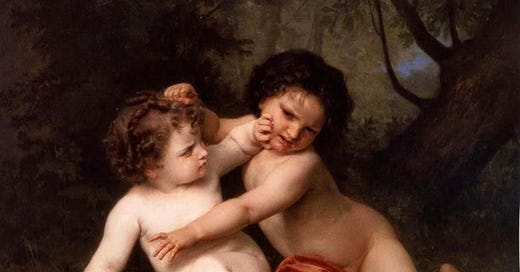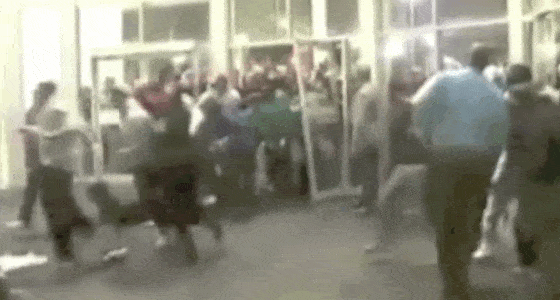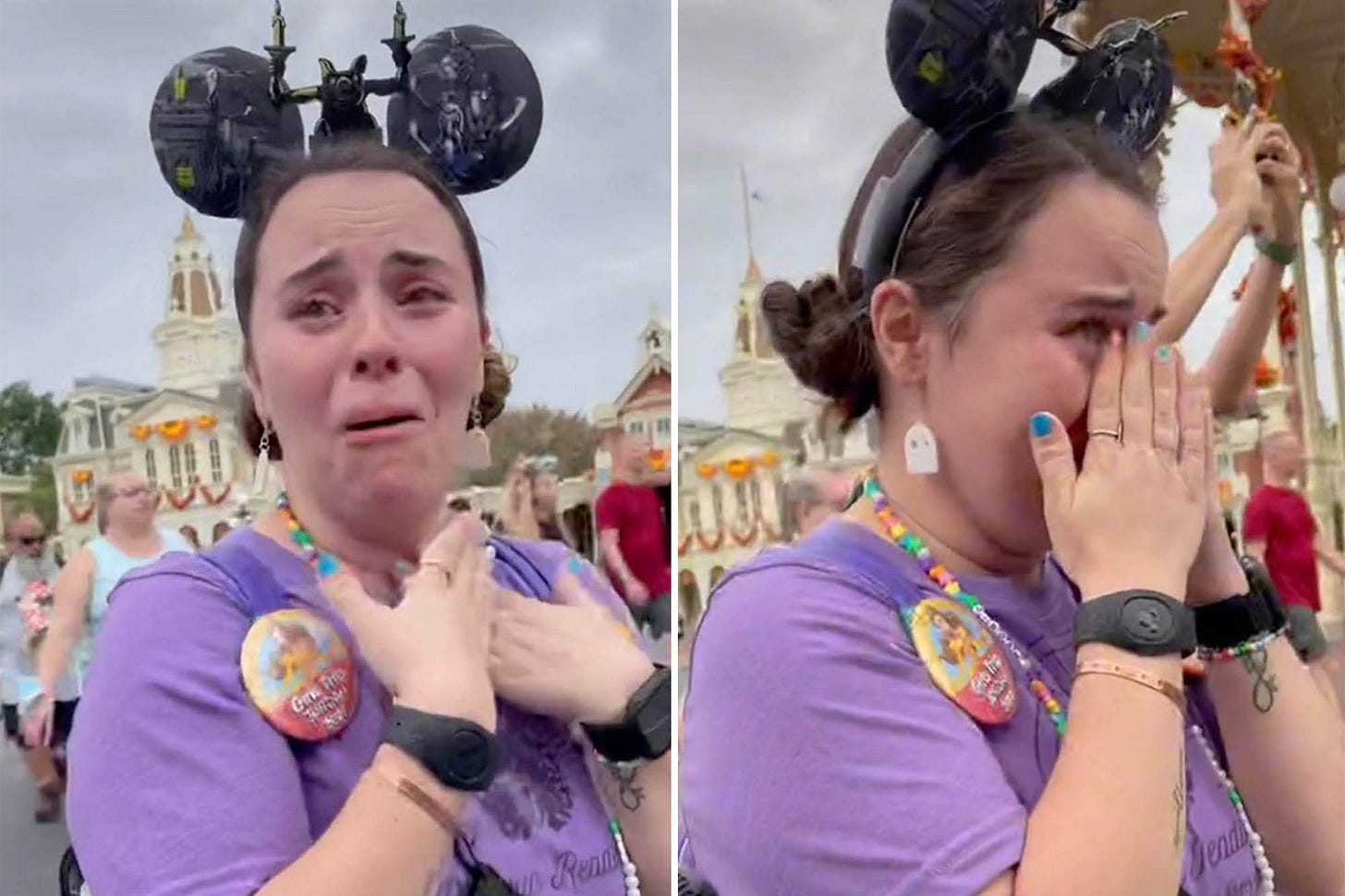A World of Lost Boys
Infantile behavior defines our culture. It's high time we left Neverland
“[M]en and women to expect that the norms of childhood will endure into the adult world…the result that society enters a kind of death spiral of immaturity.”
—
, The Children’s Crusade1
When I was a wee babe, I trusted adults, as children often do. I trusted them somewhat blindly and held them in very high esteem. To not follow an adult’s orders was practically insane. They were always in the right, even if I didn’t like them or their orders very much. To me, adults were paragons of maturity, refinement, morals, and logic. They weren’t simply adults but Adults™. Sure, there were “bad guys” who were snooty, wicked ignoramuses, but they were far and few in between.
As a young child, I couldn’t wait to one day become an Adult™ and uphold the traditions of bravery, elegance, sanity, and rational purchasing decisions…
Turns out, I was wrong about adults. Like, 10000% wrong.
Adults in my lifetime have shown that they are not sane. From Joe across the street to Joe in the White House, society as I’ve known it has been one giant freak show. If aliens saw the state of adults today, they would claim Earth as a “no-go zone.” Not because they’d get obliterated, but because of the brain rot they’d contract just from watching Netflix.
And it’s not just the general consumerist insanity that’s the problem, but the widespread immaturity of adults today. “Cluster B,” “psychotic,” and “infantile,” are all very good terms to describe the state of affairs. It’s the 1984-Brave New World combo! In this state, you are never responsible, and everyone else is to blame. You can be petty and willfully ignorant, and if someone takes notice, they’re just gaslighting. You should never make sacrifices and live your best life! Oh, and you should also opt out of “adulting,” because growing up totally sucks!
For years we have lived in a culture of Lost Boys. It’s time to stop.
Take “kidults,” for example. First noticed in the early-to-mid 2000s, kidulting2 is a subculture of adults who—simply put—don’t want to grow up. One kidult went as far as to describe himself as “a child in a grown-up body.”3 Carl Jung would’ve dubbed this man as a “puer aeternus”, an eternal boy. However that term isn’t catchy or marketable, so kidult it is.
Overall, kidults are much like this 38-year-old: equal parts terrifying, pitiful, and hilarious.
Kidults have a markedly bleak outlook on life, sacrifice, and responsibility. Rather than viewing adulthood as a means for finding freedom, they see a grisly trap. To cope, they fashion a world of expensive play. Markedly self-centered, kidults make a show out of acting childish and age-regressed. Take the classic “Disney Adult,” who practically act as though the theme parks are religious monuments dedicated to them.
What’s worse is that many kidults are parents. Because their goal is to reject maturity and structure, kidults become laissez-faire, a style of parenting that often leads children to lack patience, discipline, and respect for authority. In short, kidults raise kidults.
Perhaps I should note that there is a difference between kidults, collectors, and people who just love nostalgia, although the line can be blurred. Collectors and nostalgia fans know they are adults and have no delusions about their age or that the world requires them to be mature. They recognize that their seemingly youthful or childish hobbies and interests are all in good fun. Kidults, on the other hand…not so much.
Kidults may claim to be in touch with their inner child, but instead perpetuate a caricature of childhood. Their Peter Pan Syndrome is a microcosm of today’s society. They flee from accountability and maturity in favor of an impulsive, vain, and consumerist lifestyle. And corporations have taken notice. Today, it’s easy to find products encouraging infantile behavior, such as McDonald’s “adult Happy Meals.”
In a way, kidults are the poster boys for our modern dystopia—always spending money in a desperate attempt to stay young and cool, forever chasing an ideal, only to wind up delusional and/or cynical in the end.
This mindset extends beyond being a self-proclaimed “kidult,” however. Infantile behavior infects our society, and we enable it. We only pay attention when politicians are arguing or posting viral tweets. We only watch reality TV when grown women are snapping at one another. We may even participate in it ourselves, such as taking screenshots of other people’s Notes, only to insult them ad hominem. The list is endless.
The reason we have a culture of immaturity seems to be twofold: we have no incentive to grow up and the internet only solidifies our childish ways.
In the past, society had its coming-of-age rituals. Whether this was killing a bear, coming out in a debutante ball, joining the military, or getting a job as a clerk, there was something to induct youth into the mindset of being an adult. Even if they still relied on their parents or other adults for guidance or even money, these rituals symbolically signaled to the child, “You’re a wo/man now.” This was the case for both collectivist and individualist societies.
However, our modern age increasingly lacks any sort of coming-of-age rituals. With nothing telling us to grow up, we have no reason to stop behaving like petulant children. Our digital footprint only makes it worse. Offline, you can say something boneheaded and people will forget about it within the month. Online, those same words will exist in perpetuity, even if they’re never shared, screenshot, or quoted. The words, the photos, and the memes you posted are there. They will always be there.
Thanks to social media, your past self becomes immortal. Personal growth and evolution become difficult once those little circular profile pictures you interact with online come to expect a certain behavior out of you. Sure, you can always start a new account, but due to your past behaviors (and data mining), you’ll probably just wind up in the same circles as before. You’ll fall into the same harmful rabbit holes, have the same trivial arguments, and go with the flow of the same echo chambers. Social media doesn’t promote development—it stalls and regresses it. To wake up, mature, and realize that your past self was wrong is almost impossible in this self-aggrandizing world. In this way, we find ourselves forever fussy little Lost Boys, lacking discipline and giving into our every impulse.
Meanwhile, while everyone’s busy acting like psychotic toddlers, the youth—the actual kids—are watching.
I first noticed the strange, infantile behavior of adults when I was 12, during the 2016 election. It was the first time I ever cared about politics, really because all the kids online cared. But instead of arguing about who would win, we were laughing. “Hillary is gonna be president,” we jeered. “She’s such a snake! Oh, but don’t forget Donald Trump—Mr. Small Loan of a Million Dollars!” We saw the foolishness of it all, while the grown-ups were busy tearing at each other’s throats.
We watched the polarization of our supposed role models, and soon, we began to emulate it. After the election, we kids started to fragment. Building walls and identifying as an attack helicopter suddenly became offensive. Our own development began to stagnate. Almost eight years later, Gen Z is still trying to recover.
In this world of Lost Boys, we lack role models. Both offline and online, all youth see are infantile adults—celebrities, academics, and even their own parents. Films and books are no better. There is nothing in pop culture encouraging us to grow up.
Even the mythical 18th birthday has lost its luster. For many youth today, their 18th birthday is just that—a birthday. Nothing special or significant. Not even a smidgen of existential dread or hope! They don’t see themselves as finally being adults. In fact, I’ve heard several still refer to themselves as kids. (“Come on, we’re kids,” they complain and scoff.)
At 18, Joan of Arc, the Marquis de Lafayette, Alexander the Great, and countless others had already seen battle; Mary Shelley had written Frankenstein; Rockefeller was two years shy of going into his first business. These were not children but young adults, and they carried themselves as such. Meanwhile, here’s Gen Z, more lost than the Lost Generation, wondering if it’s even worth working a 9 to 5.
We’re trying to find our way, with mixed success. Why do you think all those “aesthetics” exist? For fun? Sure, but it’s also a sign that tens of millions are trying to find some identity to attach to—some group to help us make sense of the madness in the absence of the role models we desire. We don’t know what it is to be a man or woman anymore—sadly, both metaphorically and literally. All we know is how to be kids, terminally wired to the net. Gen Z is a wandering generation, natives of a digital Neverland.
What to do? Perhaps, like that blond cartoon sailor Flapjack said, grow up!
But what does that mean? Well, from my observation it means having morals and principles; being honest; being emotionally mature; stepping up to make those hard sacrifices nobody wants to; having responsibility. Growing up is more than just “adulting,” but about fully embracing the art of being an Adult™.
Sure, these things aren’t always “fun,” but it’s what’s needed. It’s how society was able to develop and progress in the first place.
What kidults and all the other chronically online Narcissuses (Narcissi?), Peter Pans, and Gilgameshes can’t understand is this—adulthood doesn’t mean giving up your love of life. In fact, I’d argue that the older we get, the more we should revel in life’s mysteries and joys.
Live, love, laugh, or whatever they say. But take responsibility.
“Being silly is still allowed, not excluded by adulthood. What's excluded by adulthood is thoughtlessness, so be thoughtful and silly.”
— Hank Green4
Furthermore, reflect on your life. Where are your flaws? Do certain aspects of the internet or even wider society bring them out? If so, you should probably step away. Growth doesn’t happen in the digital realm, where ChatGPT still thinks it’s 2022. It happens outside, beyond Neverland.
A great article on a similar topic. Honestly, when it was published, I had doubts about even finishing the first draft of this piece, for fear of seeming like I was copying. But the fellas on Notes hyped me up to finish it anyway. Thanks, fellas.
Also once called “grups”, “twixters”, “adultescents”, and “rejuveniles.”
Note, I am not discussing so-called “trans-age” individuals—who have various sexual paraphilias—though whether this is the case for some kidults is unclear.
A scientist who is like a modern Bill Nye. I used to spend hours watching his videos as a preteen.









The immortalisation of the past self online as a cause for incentivising stagnation is such a great observation. I completely agree that young people especially (but not exclusively) are becoming more and more lost in the increasingly digitised world. I think a major difference for a lot of younger people is that they had no 'stable' ground to stand on before stepping onto these new platforms. Kids who have grown up with the internet as their primary reality are now reaching the age of adulthood and I think it's no wonder that they can't come to terms with that. What does adulthood mean on the internet? The internet itself probably provides a million answers to this question, and just confuses the matter even more.
This groundlessness - and the black-and-white thinking patterns that it has exacerbated - is I think a big reason why the role models that people are desperately latching onto are becoming more and more one-dimensional, cartoonish... almost as if a person has to make themselves and their beliefs into a brand in order to be taken seriously. On the internet we are not incentivised to be ourselves, but to sell ourselves.
You mention that the older we get the more we should revel in life's mysteries and joys, and I completely agree. The older we get the more we should come to understand how little we actually know, and that can be a wonderful thing. But the internet demystifies life by making all answers (whether right or wrong or somewhere in between) immediately accessible, and it strips away joy too by the same means... it teaches us that we don't have to wait, and our pleasure and reward functions are being absolutely brutalised by this all-access playground of overstimulation.
In conclusion: we really all should just touch grass.
Thanks for the great article, keep it up!
Nice post J.S. Yes, the mentality in the west these days is quite infantile. I guess it shows how malleable people's mentalities are overall. Sure, we need food, water, shelter and sex, but other than that, it's pretty easy for our environment to manipulate human beliefs in all sorts of strange and odd directions.
You might enjoy this old post from a defunct blog, "Millennials: the Dying Children": https://archive.ph/7VPGE